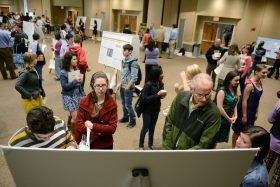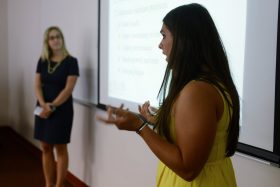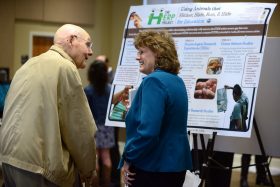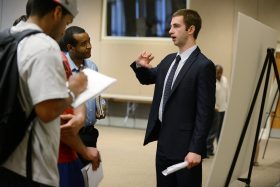The Spring Undergraduate Research Forum at Elon marks its 20th anniversary this month as young scholars and their mentors share new findings across a range of disciplines.

That was just the student scholarship. Elon University faculty? Professors shared their research into factors that influence memory impairment in older adults, mathematical modeling investigations of epileptic seizures, and sorcery and witchcraft in Spain, among other topics.
The best of undergraduate and faculty work was on display April 23 across campus during the 20th annual Spring Undergraduate Research Forum, part of the larger CELEBRATE! Week annual program that showcases scholarship and creative achievements at Elon University.
About 200 students took part in the day, either by presenting their research on posters in McKinnon Hall or by giving 15-minute presentations in the Koury Business Center. “The quality of the work is great,” said Professor Paul Miller, director of undergraduate research at the university. “It’s a testament to the mentoring dynamic between our faculty and students. That’s what really makes of this possible.”

Undergraduate research helps students apply classroom learning to new areas while offering the opportunity to engage in inquiry in a chosen field of study and to experience first-hand what professionals in a chosen field do. It also allows students to closely work with a faculty mentor on research.
Having students and faculty present together during the early poster session was intentional, Miller added. “It’s important to show that inquisitiveness and curiosity sit at the heart of disciplines,” he said. “We as faculty are lifelong learners and we hope students will be, too. This is modeling our own actions, and it shows that it’s a part of who we are.”
Elon junior Grant Fisher, a public health studies major and member of the Elon Phoenix baseball team, was among the presenters in McKinnon Hall during College Coffee. Fisher worked with Amanda Tapler, a faculty member in the Department of Health and Human Performance, on his project “Healthy Mouths Promote Health Bodies.”

“Too often we separate dentistry from the rest of medicine. I’m trying to draw them both together,” said Fisher, who plans to study dentistry after completing his undergraduate studies. “(Research) is a chance to take what you’re learning in the classroom and apply it elsewhere. If you’re passionate about something, do it. This is a great experience and a way to build a relationship with a mentor.”
Though many student presenters are juniors and seniors, SURF introduces freshmen and sophomores to research possibilities.
“It’s valuable to nurture young researchers, to give them a sense of what it means to conduct research and then present it,” said Associate Professor Terry Tomasek, a faculty member in the School of Education studying the mental or social barriers that adolescents encounter when they think about careers in science.

“I wasn’t as aware of research possibilities coming into this, but she showed me the importance of research as it relates to education,” Edwards said. “The readings we’ve done have highlighted issues associated with the modern classroom.”
For more information on the Spring Undergraduate Research Forum, visit the university’s 2013 CELEBRATE! Week website.


